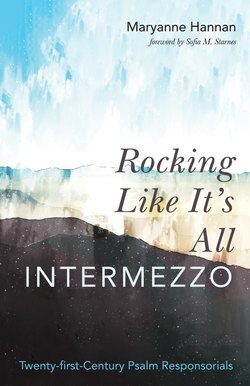Rocking Like It’s All Intermezzo

Реклама. ООО «ЛитРес», ИНН: 7719571260.
Оглавление
Maryanne Hannan. Rocking Like It’s All Intermezzo
Rocking Like It’s All Intermezzo
Table of Contents
Foreword
Marvelous
Understanding
Time
The Created
Clearing the Abyss
God’s Word
Sin
Temptations
Uncertain
Creating
Renewal
Inclining
Shadow
Embodied
Intention
Personal
Pact
Hunger
Indulgence
Longing
Flavors
Geopolitics
Fear of the Lord
The Enemy
Prerequisite
Spiritual Geography
You Did
Tears
Cycle
God’s Greatness
Gone
What If He Said
Threshold
Praise
Paths
All-In, God
Footing
Boon
Strife
Naming
Desire
Watch
Silence
Gaps
Concert
Harmonics
Gifting
Sayeth the Lord
Power
Definitions
Numbers
Partial
Answered Prayers
Protection
Acceptance
Wings
Recognition
Spirit
Royal Garment
Interlude
Communion
Doxology
More about Waiting
Aligned
Acknowledgments
Отрывок из книги
Twenty-first-Century Psalm Responsorials
Maryanne Hannan
.....
The poet’s response to the psalms starts with a recognition of a particular trait which distinguishes humans from all other creatures. That trait is “longing”; for we have been “chiseled with longing,” she avers. No other creature aspires beyond itself, experiences lack that exceeds physical lack, reaches forth between hope and despair, qualitatively, to the extent we humans do. But that is not all. There is more to the verse “chiseled with longing,” for it refers as well to the one who did the chiseling “with longing,” that is, with a lover’s desire to be one with the beloved. Thus do we learn in a nutshell, within this wisely succinct couplet, that the entirety of this work is to be a conversation initiated—undoubtedly—by the chiseler, the creator, who is now mostly silent, in order to allow his creature to respond through her own imperfect nature. It is not easy; it can never be easy, when the distance between one and the other is so vast, when only he can bridge it. How to rise out of “the muck / I’m made of,” the poet laments in this poem. This lament is a running thread through the book. With or without a given answer, the poet gives credence to her patent aspiration to clutch the wind—wind that is, breath, the pneuma of God—seemingly out of reach. Yet, how or why should we think it gone? “After the wind,” there is “after—”
Rocking—even without the rest of the verse—would itself be a perfect title for this inspired and inspiring collection. It evokes solidity and motion; the hard core, gravel and stone which is our human terrain and the motion of cradle, hither and there, evoking wonder, which can both unnerve and soothe us with possibility. Over and over, in Hannan’s work, we find this tension between place and destination, between acceptance and struggle, between knowing and unknowing. It is a push-and-pull whose radix must dig deep into a recognition of our ills, the wrongs we do, the errors we bear. We do not hear enough about this, I’m afraid, in today’s soft-pedaling of moral truths; we do not find, as we do in Hannan’s poems, a denouncement of sin for what it is: “betrayal of [our] core,” “putrefying journey” of those “bruised at birth.” The poet even wonders (concerned?) how “sin / [has] become outré.” It is all too much for modern sensibilities. Yet, it is only through this honest appraisal of who and where we are, that the poet can emerge as prophet, with courage to “taste my taint.” Only then is she able to bring forth credible poems, poems capable of stirring the reader out of a self-aggrandizing stupor, to embark on the difficult but necessary journey demanded by our divine calling.
.....